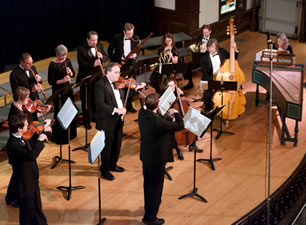The annual presentation of performances of the complete Messiah of Handel has been a Triangle Christmas tradition since 1933 except for one year during WWII. In recent decades, the three performances over a weekend have been near sellouts for available seating in Duke Chapel. This is a golden period for the series because its current director, Rodney Wynkoop, has been extraordinarily successful in turning the Gothic chapel’s long reverberation period into an asset. His well-prepared 100-voice Duke Chapel Choir, his ad hoc orchestra of the region’s finest musicians, and his always enterprising selection of soloists have cemented an enviable reputation for outstanding performances.
Handel, in the white heat of inspiration, composed the three-part oratorio in 24 days in 1741, using a text compiled by Charles Jennings. The librettist drew upon the King James Bible and the Book of Common Prayer. The first performance was given April 13, 1742 in Dublin, Ireland during the Easter season. The London debut of the oratorio took place March 23, 1743. Handel composed or rearranged arias and recitative for specific singers for subsequent revivals. These alternatives provide conductors a source for spicing up complete performances. Wynkoop has drawn upon these options in the past.
Wynkoop had four outstanding, well-matched vocal soloists with ample, young voices, and outstanding diction. The stand out was soprano Ava Pine whose gorgeous, warm voice seemed to be lovingly embraced by the Chapel’s acoustics. Her beautifully focused, precise highs soared unfettered into the hall. The reverberation seemed only to add a glow to her golden sound. Contralto
Monica Reinagel‘s burnished, rich voice made a splendid contrast to Pine and it blended well with the tenor in their duet. Bill Hite‘s clarion, ringing tenor voice was most welcome. His warm timbre was readily projected. Bass Douglas Williams‘ full, rich voice had plenty of even support and all the low notes needed. All four soloists gave a master demonstration of how to clearly and expressively project a text. Their discreet application of vocal ornaments was delightful.
The agility and clarity of the Duke Chapel Choir was amazing and often breathtaking. The ensemble, during divided sections such as women’s versus men’s voices, was outstanding.
The text could have been taken down in dictation whether sung by small parts of the choir or its entirety. Memorable was the playful opening of “All we, like sheep” contrasted against the concluding ominous “and the Lord hath laid on him.” There was nothing routine about their glorious, stirring “Hallelujah!” chorus. Their concluding “Worthy is the Lamb” was majestic.
The playing of the ad hoc Orchestra Pro Cantores was outstanding. Concertmaster Eric Pritchard excelled in his numerous solos. Pritchard often joined with second violin leader Dana Friedli, cellist Virginia Hudson, and David Arcus, on either harpsichord or chamber organ, to provide superb continuo support. No Messiah could succeed without a superb, ringing trumpet to accompany the bass aria “The trumpet shall sound,” and Don Eagle delivered the goods in spades. The acoustics just added icing on the musical treat!











